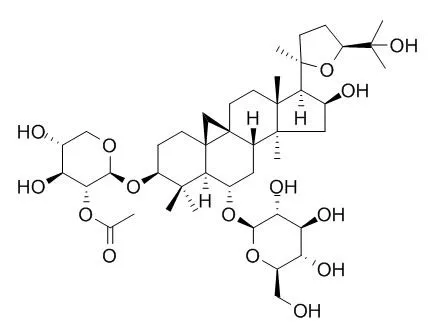| Cell Research: |
| Int J Mol Med. 2012 Jun;29(6):1090-8. | | Astragaloside II induces osteogenic activities of osteoblasts through the bone morphogenetic protein-2/MAPK and Smad1/5/8 pathways.[Pubmed: 22426655] | Radix Astragalus has been identified to exert beneficial effects in preventing postmenopausal bone loss. However, the active ingredients and mechanism of action remain unknown.
METHODS AND RESULTS:
In this study, we examined the effect of Astragaloside II (AST II), which is a monomer of Astragalus saponin, on the viability, proliferation, differentiation and maturation of rat primary osteoblasts, as well as its relevant molecular mechanism. We found that AST II exhibits a significant induction of proliferation, differentiation and mineralization in primary osteoblasts. AST II stimulates osteoblast differentiation at various stages, from early to late stage of differentiated osteoblasts. Furthermore, induction of differentiation by AST II is associated with increased expression of bone morphogenetic protein-2 (BMP-2), activation of Smad1/5/8, ERK1/2 and p38, and increased expression of core-binding factor 1 (Cbfa1)/Runx2. BMP antagonist (Noggin) blocks the effect of AST II on cell differentiation, and Smad1/5/8, p38, Cbfa1 expression, but only partly decreases ERK1/2 activation. This indicates that BMP-2 is essential in AST II-mediated osteoblast differentiation and Smad1/5/8, p38, Cbfa1 activation, and is partly involved in ERK1/2 activation.
CONCLUSIONS:
In conclusion, although in vivo studies are required in the future, as a phyto-saponin of Radix Astragalus, AST II may become a novel candidate that is beneficial for stimulating the osteoblastic activity resulting in bone formation, which has not been recognized and reported previously. | | Biomed. Pharmacother., 2016, 81:166-75. | | AstragalosideII inhibits autophagic flux and enhance chemosensitivity of cisplatin in human cancer cells.[Pubmed: 27261591] | Inhibition of autophagy has been daily served as a promising anti-cancer treatment strategies. AstragalosideII (ASII), a main compound isolated from traditional Chinese medicine Radix Astragali, has been demonstrated to inhibit autophagy and reverse multidrug resistance in human hepatic cancer cells Bel-7402/5-FU.
METHODS AND RESULTS:
In this study, we inspected the function and mechanisms of ASII and cisplatin on autophagy in human cancer cells, and assessed the effect of ASII on cisplatin-induced apoptosis. We found ASII increased LC3II protein level, p62 protein level and GFP-LC3 puncta accumulation in human cancer cells. Furthermore, we found that ASII downregulated the expression of lysosomal cathepsinB/L (CTSB/L) in EBSS medium and affected the lysosomal acidification. Finally, we demonstrated that cisplatin induced protective autophagy which was involved of PI3K/Akt/mTOR pathway. Moreover, ASII in conjunction with cisplatin significant reduced cell viability, arrested in S phase and increased apoptosis.
CONCLUSIONS:
In conclusion, these findings suggested that ASII served as autophagy inhibitor which restored chemosensitivity of anticancer agent cisplatin and enhanced tumor cell death. |
|






 Cell. 2018 Jan 11;172(1-2):249-261.e12. doi: 10.1016/j.cell.2017.12.019.IF=36.216(2019)
Cell. 2018 Jan 11;172(1-2):249-261.e12. doi: 10.1016/j.cell.2017.12.019.IF=36.216(2019) Cell Metab. 2020 Mar 3;31(3):534-548.e5. doi: 10.1016/j.cmet.2020.01.002.IF=22.415(2019)
Cell Metab. 2020 Mar 3;31(3):534-548.e5. doi: 10.1016/j.cmet.2020.01.002.IF=22.415(2019) Mol Cell. 2017 Nov 16;68(4):673-685.e6. doi: 10.1016/j.molcel.2017.10.022.IF=14.548(2019)
Mol Cell. 2017 Nov 16;68(4):673-685.e6. doi: 10.1016/j.molcel.2017.10.022.IF=14.548(2019)